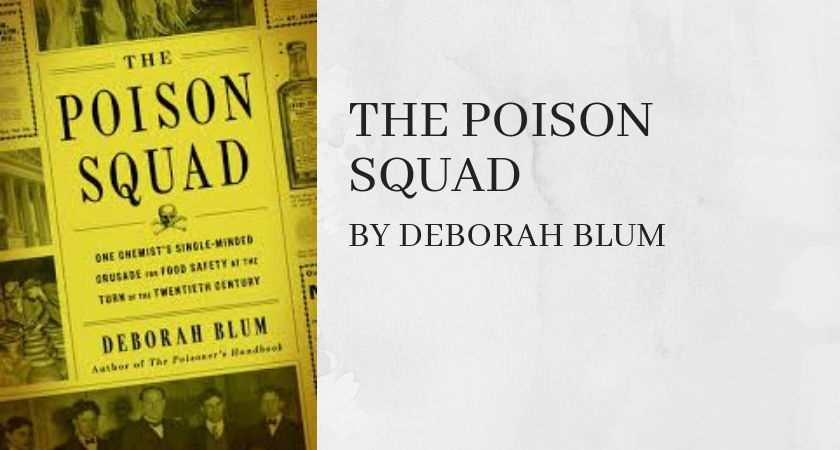After reading about how teas used to be adulterated, the synopsis of The Poison Squad caught my eye. And, I have to admit, the book shocked me – I didn’t think that deception in food could be that bad!
The Poison Squad is the story of Harvey Wiley, the father of the Pure Food and Drug Act. The early 1900s was a bad time for food – as the book puts it, ” ‘Honey’ often proved to be thickened, colored corn syrup, and ‘vanilla’ extract a mixture of alcohol and brown food coloring. ‘Strawberry’ jam could be sweetened paste made from mashed apple peelings laced with grass seeds and dyed red” and so forth.
Given my interest in tea, I kept an eye out for fake tea and found something called “lie tea”. As the book describes it, “this substance, as its name implied, was an imitation of tea, usually containing fragments or dust of the genuine leaves, foreign leaves, and mineral matters, held together by means of a starch solution.”
Ewwwww!
Apart from the fake food, a lot of food was preserved with poisonous substances like formaldehyde, borax, and much more. One scientist in Wiley’s division “tested 198 samples of candy and found that a full 115 were tainted by the use of dangerous dyes, mostly arsenic and lead chromate.”
Back then, food manufacturers argued against government interference in food regulation, arguing that these were harmful to the business. Additionally, they argued that it was better for the food to stay preserved than to have it rot (further) and spread diseases. It took Harvey Wiley and his poison squad, a team of volunteers who subjected themselves to the preservatives to see their effects, to prove that what was in the food was bad for the human body.
You would think that once all these fakery and harmful preservatives were brought to light, the government would want to move swiftly and clamp down on these food manufacturers, right? Well, although the American public was rightly outraged at what they were eating, the government was strangely reluctant to act. Agriculture Secretary, James Wilson, thought that Wiley was too much of a crusader and even brought in a board of people whose purpose was to ‘review’ Wiley’s findings.
I found The Poison Squad to be a fascinating read. It covers Wiley’s years in office and documents his battle to make sure food is pure. Wiley is extremely strict about food standards, perhaps so strict that harmed it his political career, but you have to admire him for it.
If you’re interested in food safety, or just interested in knowing more about how food and the regulation needed, this is the book to read. It’s hooked me from the start and I couldn’t put it down. And while there was a pretty long list of people (long enough that the first few pages were a character list), keeping track of them felt natural. You don’t have to be a history buff to enjoy this.
Disclaimer: I got a free copy of this book from the publisher via NetGalley in exchange for a free and honest review.
